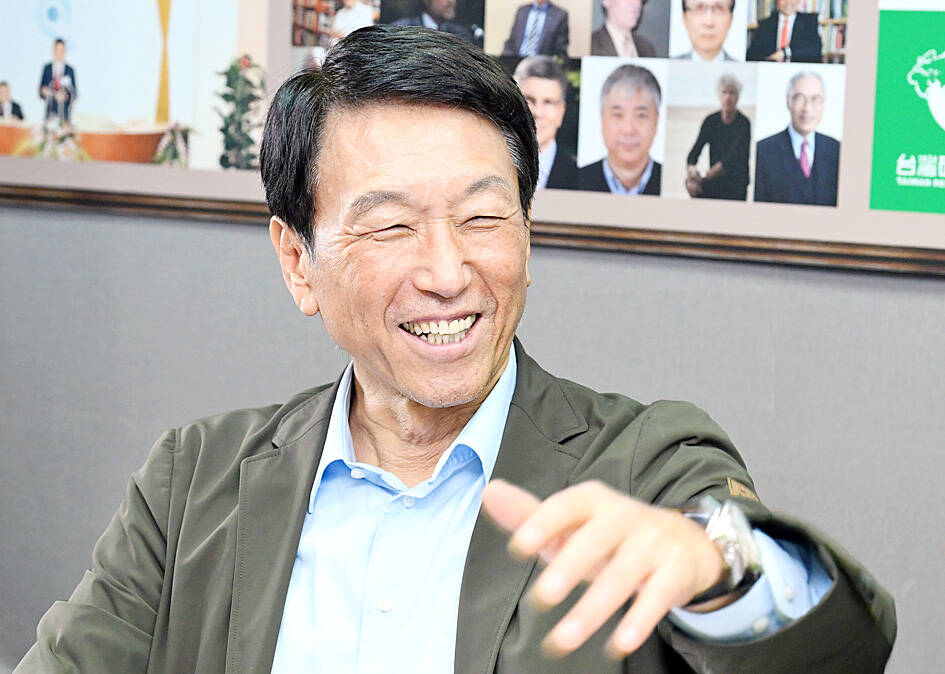Taiwan’s armed forces must learn to embrace innovation, accept risks and confront problems with honesty to get out of the doldrums of “preparing for yesterday’s war,” retired admiral Lee Hsi-ming (李喜明), former chief of the general staff, told a news conference at the Taipei School of Economics and Political Science Foundation on Friday.
The foundation held the event to release its 2022-2023 Republic of China National Defense Review.
National defense strategy, joint warfare, cyberoperations, strategic reserve forces and self-reliant national defense were the key aspects of defense underscored by the paper, which focussed on providing alternative policies for the government’s consideration, Lee said.

Photo: Liao Chen-huei, Taipei Times
Taiwan faces existential and coercive threats, with China’s utilization of “gray zone” conflict encapsulating the latter, he said, adding that gray zone conflict is characterized by using the threat of force to create fear and intimidation.
Taiwan lacks the sufficient military capability to address coercive threats, which highlights the urgent need for applying asymmetry to national defense in all domains, he said.
Instead of spending its limited resources on larger orders of fighter jets and warships, Taiwan should keep Beijing’s tactics in check by using crewed systems and remaining calm without losing perspective, Lee said.
Some analysts have called attention to the Chinese People’s Liberation Army (PLA) Navy’s construction of new aircraft carriers and argued that these surface combatants could be deployed in a hypothetical blockade of Taiwan, he said.
The analysts are mistaken because they do not grasp that the purpose of the carriers is to serve Beijing’s quest for global hegemony, not be deployed immediately in the Taiwan Strait, Lee’s said.
Chinese carriers are not likely to play a significant role in a war against Taiwan, as they are part of Beijing’s effort to build a first-rate military that can project power on a global scale by 2049, not to be immediately risked in the Taiwan Strait, he said.
Should the PLA launch an attack on Taiwan, its main goal would be to overcome the resistance of defending forces while preventing the US or other nations from interfering with its invasion, he said.
China’s advanced ballistic missiles, submarines and bombers are far more effective weapons in accomplishing these aims than deploying aircraft carriers in an anti-access, area-denial role, Lee said, adding that the US is clearly more troubled by these PLA capabilities.
Regarding cyberwarfare, Lee said that the military’s Information, Communications and Electronic Force Command appears to have neglected the Internet, which does not fall into the military definition of information, communications or electronic warfare.
Contesting the Internet space is a crucial mission that the armed forces of the US and Israel have integrated into their military intelligence services, he said, adding that intelligence is foundational to successful operations on the Internet.

The Grand Hotel Taipei on Saturday confirmed that its information system had been illegally accessed and expressed its deepest apologies for the concern it has caused its customers, adding that the issue is being investigated by the Ministry of Justice Investigation Bureau. The hotel said that on Tuesday last week, it had discovered an external illegal intrusion into its information system. An initial digital forensic investigation confirmed that parts of the system had been accessed, it said, adding that the possibility that some customer data were stolen and leaked could not be ruled out. The actual scope and content of the affected data

‘LIKE-MINDED PARTNER’: Tako van Popta said it would be inappropriate to delay signing the deal with Taiwan because of China, adding he would promote the issue Canadian senators have stressed Taiwan’s importance for international trade and expressed enthusiasm for ensuring the Taiwan-Canada trade cooperation framework agreement is implemented this year. Representative to Canada Harry Tseng (曾厚仁) in an interview with the Central News Agency (CNA) said he was increasingly uneasy about Ottawa’s delays in signing the agreement, especially as Ottawa has warmed toward Beijing. There are “no negotiations left. Not only [is it] initialed, we have three versions of the text ready: English, French and Mandarin,” Tseng said. “That tells you how close we are to the final signature.” Tseng said that he hoped Canadian Prime Minister Mark Carney

President William Lai (賴清德) yesterday bestowed one of Taiwan’s highest honors on Saint Vincent and the Grenadines (SVG) Ambassador Andrea Clare Bowman in recognition of her contributions to bilateral ties. “By conferring the Order of Brilliant Star with Grand Cordon on Ambassador Bowman today, I want to sincerely thank her, on behalf of the Taiwanese people, for her outstanding contribution to deepening diplomatic ties between Taiwan and SVG,” Lai said at a ceremony held at the Presidential Office in Taipei. He noted that Bowman became SVG’s first ambassador to Taiwan in 2019 and

POSITIVE DEVELOPMENT: Japan and the US are expected to hold in-depth discussions on Taiwan-related issues during the meeting next month, Japanese sources said The holding of a Japan-US leaders’ meeting ahead of US President Donald Trump’s visit to China is positive news for Taiwan, former Japan-Taiwan Exchange Association representative Hiroyasu Izumi said yesterday. After the Liberal Democratic Party’s landslide victory in Japan’s House of Representatives election, Japanese Prime Minister Sanae Takaichi is scheduled to visit the US next month, where she is to meet with Trump ahead of the US president’s planned visit to China from March 31 to April 2 for a meeting with Chinese President Xi Jinping (習近平). Japan and the US are expected to hold in-depth discussions on Taiwan-related issues during the